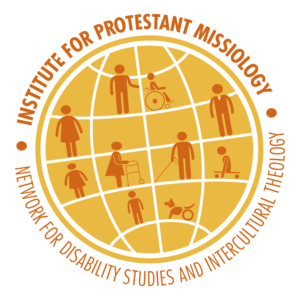International Conference 2021: Disability Studies and Intercultural Theology: Foundations – Case Studies – Ethical Implications
Flyer to print Disability Conference 2021_Print+3 mm Beschnittzugabe_24.6
Flyer as PDF Disability Conference 2021_web_24.06.
1 Presentation of the scientific objective of the event
 The conference Disability Studies and Intercultural Theology: Foundations – Case Studies – Ethical Implications will take place from 02.09 – 03.09.2021 in Frankfurt at the Haus am Dom. It is organized by Dr. Katharina Peetz and Dr. Eberhard Werner, who are cooperatively connected in the ecumenical network Disability Studies and Intercultural Theology. As part of the network’s work, an anthology edited by Eberhard Werner and Samuel Groß entitled Von Barmherzigkeit und Ausgrenzung: Transkulturelle Diskurse der Disability Studies in der Interkulturellen Theologie (On Mercy and Exclusion: Transcultural Discourses of Disability Studies in Intercultural Theology) will be published in March 2021, providing initial impetus for the content of the conference (Werner/Groß 2021).
The conference Disability Studies and Intercultural Theology: Foundations – Case Studies – Ethical Implications will take place from 02.09 – 03.09.2021 in Frankfurt at the Haus am Dom. It is organized by Dr. Katharina Peetz and Dr. Eberhard Werner, who are cooperatively connected in the ecumenical network Disability Studies and Intercultural Theology. As part of the network’s work, an anthology edited by Eberhard Werner and Samuel Groß entitled Von Barmherzigkeit und Ausgrenzung: Transkulturelle Diskurse der Disability Studies in der Interkulturellen Theologie (On Mercy and Exclusion: Transcultural Discourses of Disability Studies in Intercultural Theology) will be published in March 2021, providing initial impetus for the content of the conference (Werner/Groß 2021).
2 Presentation of the significance of the event for the participating disciplines
People with physical or mental impairments are “disabled” by cultural, social as well as contextual factors. They experience that their existence is not simply given without question. “Did you have to do that?” is a question that parents of children with trisomy 21 often hear. Living with impairment(s) often also means experiencing exclusion and discrimination and being disabled precisely because of this: This can be the stairs that cannot be mastered with a wheelchair, but it can also be the encounter with people who openly show their fear of contact and prejudice.
People with disabilities experience such discrimination in different cultures. Especially in African countries like Nigeria, the birth of a child with impairment(s) is considered a great shame, curse or punishment from God (Peetz 2021). In Germany, on the other hand, people with severe, multiple impairments in particular are hardly present in the public sphere. Their place seems to be clearly defined: in care facilities, but not at the swimming lake or in a restaurant. For example, a visit to a regular school for people with physical impairments and their parents involves an enormous personal commitment. Traveling by public transportation also requires special effort and involves more planning. The same applies to air travel or participation in conferences and congresses.
Against this background, the proposed conference aims to discuss the significance of Disability Studies (DS) for Intercultural Theology in an interdisciplinary exchange (theology, medicine, philosophy, social pedagogy). First, the basics of the two fields of Intercultural Theology and Disability Studies will be examined. Based on this, the relationship between DS and Intercultural Theology will be concretized by looking at individual case studies. Finally, ethical implications will be drawn from a theological perspective for dealing with physical and mental disabilities in an intercultural context. The speakers will examine the relationship between intercultural theology and DS from different perspectives, taking into account different geographical contexts (Germany, Great Britain, Switzerland or Zimbabwe). They themselves live with disability(ies) or have done research in the field of DS for a long time.
Zurück
